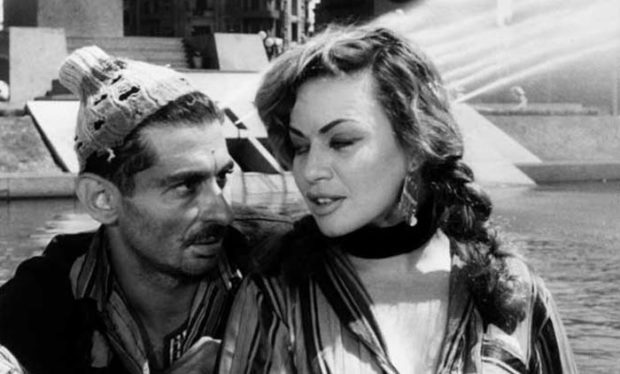 Youssef Chahine’s groundbreaking 1958 film dealt frankly with sexual issues, which did not please Egyptian audiences at the time, but it is now considered a classic of world cinema.
Youssef Chahine’s groundbreaking 1958 film dealt frankly with sexual issues, which did not please Egyptian audiences at the time, but it is now considered a classic of world cinema.
Egypt has the largest film industry in the Arab world. There have been movies produced in Egypt, mostly in Cairo, since the early silent era. There’s a period known as the “golden age” of Egyptian cinema that started in the 1940s, but it wasn’t until the 1952 revolution that toppled the monarchy that there were significant advances in film. There was one Egyptian director who, above all others, gained international recognition for his films: Youssef Chahine. His films showed in the festivals at Cannes and Berlin, among others, and he’s credited as being the one that discovered the actor Omar Sharif. But there was one film that Chahine considered to be the first that conveyed his vision, and it created quite a stir in Egypt and worldwide. From 1958, it’s Cairo Station.
The story concerns Qinawi, a lame and mentally impaired young man played by Chahine himself, who sells newspapers in the railroad station in Cairo under the protection of a kindly vendor, who defends him against the relentless teasing of other laborers in the station. In his little shack near the newsstand, Qinawi has plastered pictures of film actresses and bathing beauties from American and Egyptian magazines. He’s obviously suffering from sexual frustration—no women show interest in him—and he’s become obsessed with a pretty blonde lemonade seller named Houma, played by popular Egyptian film star Hind Rostom. Houma is loud and flirtatious; she kids around with Qinawi, like she does with most of the people at the station, but she’s engaged to Abu Siri, a handsome porter played by Farid Shawqi. Abu is trying to organize a union of railway porters to combat the corrupt local boss, and this effort forms a subplot to the main storyline involving Qinawi’s forlorn fantasy of marrying Houma.
The outdoor sequences were shot at the Ramses Railway Station in Cairo, with some of the interiors shot in a studio. Chahine vividly depicts the crowded and often chaotic atmosphere of a busy transportation hub. His direction of crowd scenes is superbly flavorful. The poverty of the people trying to scrape by as workers and vendors is masterfully conveyed, but there’s also a feeling of boisterous enjoyment and vitality along with the inevitable conflicts and desperation. As the film progresses, Qinawi’s mental state takes a dark turn, and Cairo Station becomes almost like a thriller in its story structure and pacing.
Up until then, Egyptian films usually told romantic stories about the well-to-do. Cairo Station broke that mold, but the picture’s unusual frankness about sexual repression and frustration shocked Egyptian audiences. The response was negative, even hostile. The subplot about union organizing was pretty subversive too, but it escaped notice because of the uproar about the sexual theme. The film did well at the Berlin Festival, and the government film office was perceptive enough to submit it as Egypt’s entry for the Foreign Language Film Oscars, although it didn’t make the cut.
But Chahine took the film’s rejection by home audiences to heart. He decided he needed to find ways to better appeal to Egyptian viewers, while staying true to himself and his convictions concerning political and social issues. And he succeeded, becoming a beloved and highly influential filmmaker in a career that continued until his death at the age of 82 in 2008. Cairo Station eventually found an audience in Egypt that could appreciate its honesty and dramatic power, and it’s now widely considered a classic of world cinema. It’s available for streaming and on DVD.

Lebanese director Ziad Doueiri presents an allegory of the trauma still being suffered in his home country from its 15-year civil war in the...

Christopher Nolan presents an account of Robert Oppenheimer’s career as the “father of the atomic bomb,” and the controversy surrounding him. J. Robert Oppenheimer...

Three boys grow up in the midst of ugly family conflict, in this lyrical evocation of childhood tragedy. When realism comes together with lyricism,...